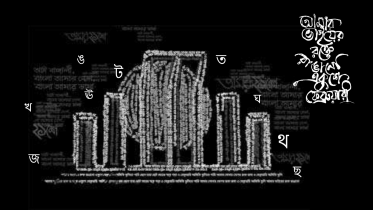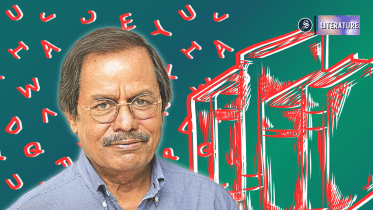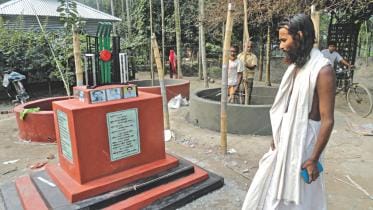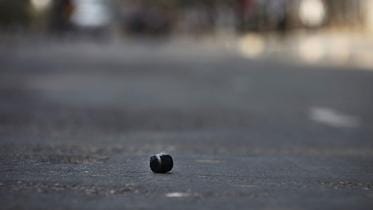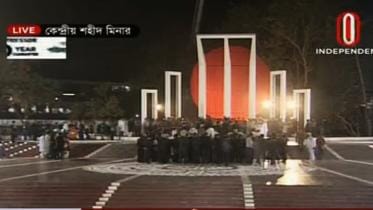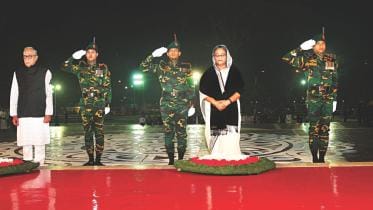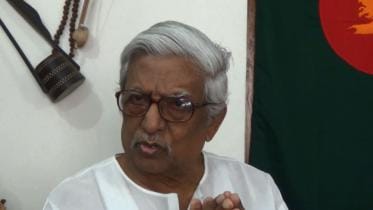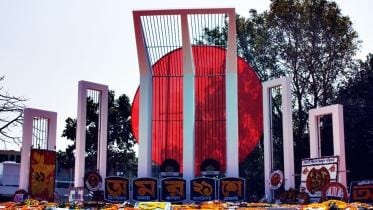Language Movement
Ahmad Rafique: A story that must not fade away
Ahmad Rafique had long-term involvement with Bangla terminology.
7 October 2025, 07:00 AM
The anthem of defiance: How ‘Amar Bhaiyer Rokte Rangano’ came to be
On this very day on February 21, 1952, the streets of Dhaka became a battlefield, soaked with the blood of young martyrs, who stood resolute in the face of oppressive authority, demanding the right to speak their mother tongue, Bangla. It was a day that would carve itself into the collective memory of the Bengali people—a day when the language movement claimed its sacred place in history, and shaped the identity of the country, as a nation.
21 February 2025, 03:00 AM
Remembering the Bangla language movement through literature
Hasan Hafizur Rahman's 'Ekushey February' created huge turmoil and faced police persecution.
24 February 2023, 18:00 PM
‘The language movement did not reject the importance of dialects’: Syed Manzoorul Islam
Professor Islam sheds light on English writing in Bangladesh, its future, and the influence of the language movement on the Bangladeshi psyche.
24 February 2023, 18:00 PM
Niaz Zaman's 'An Ekushey Anthology': Reminiscing Ekushey, 70 years on
Zaman has classified the pieces in two groups: "the early stories focus on the events that took place on 21 February—the processions, the police action and the deaths—while the later ones show how the attitude to Bangla has changed in these 70 years.
10 August 2022, 18:00 PM
Love for language wins finally
Some influential local bigots had always stopped others from setting up a Shaheed Minar in Durakuti village of Aditmari upazila in Lalmonirhat.
21 February 2016, 18:00 PM
2 bombs blasted at Jessore Shaheed Minar
Two crude bombs are exploded at central Shaheed Minar in Jessore at midnight when people were paying tributes to the martyrs of the Language Movement in 1952.
21 February 2016, 07:34 AM
President, PM pay homage to language heroes
President Abdul Hamid and Prime Minister Sheikh Hasina pay their deep homage to the martyrs of the historic Language Movement by placing wreaths at the Central Shaheed Minar in Dhaka at one minute past midnight on the occasion of Amar Ekushey and the International Mother Language Day.
20 February 2016, 18:20 PM
Nation salutes the language heroes
The nation is paying glowing tributes to the Language Movement martyrs, who laid down their lives for the recognition of Bangla as a state language on this day 64 years ago.
Humming "Amar Bhaiyer Rokte Rangano Ekushey February...", thousands of Bangalis thronged the Central Shaheed Minar in the capital and elsewhere in the early hours today to pay homage to the language heroes.
20 February 2016, 18:00 PM
Reminiscing Freedom in the Air
Kamal Lohani, the eminent journalist reminisces the Victory Day on December 16, 1971...
16 December 2015, 06:04 AM
IT'S TRUE!
Although the most iconic song of our Language Movement is Abdul Gaffer Chowdhury's “Amar Bhai'er Rokte Rangano Ekushey February”, it was not the first song written on the historic incident. The first song was written and composed by Mosharraf Uddin Ahmed on February 24, 1952, and was titled “Mrrityu Ke Jara Tuchcho Korilo Bhasha Bachabar Torey”.
19 February 2015, 18:00 PM

